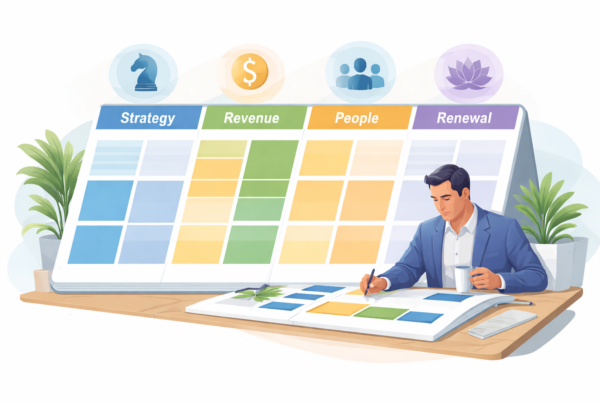The Best Coach for Executives: Elevate Your Leadership Skills
Are you struggling to elevate your leadership skills? An executive and leadership coach provides strategic advice and personal support to help you overcome challenges and achieve your goals. Discover how executive coaching can significantly impact your career and leadership effectiveness.
Key Takeaways
- Executive coaching serves as a personalized partnership that enhances leadership skills by focusing on individual strengths and areas for improvement.
- Different executive coaching services are available, including leadership development, career transition, and team effectiveness coaching, each tailored to address specific challenges and goals.
- The effectiveness of coaching depends on establishing a trust-based relationship, evaluating the coach’s credentials and experience, and ensuring alignment with the executive’s personal and professional goals.
The Best Coach for Executives: Elevate Your Leadership Skills

An executive coach is a crucial ally, not merely an advisor, aiding you in the intricate leadership journey. By honing your strengths and addressing areas needing development with bespoke support, executive coaching bolsters key competencies like emotional intelligence and strategic thinking—cornerstones of successful leadership. The secure space coaches create leaders to openly tackle obstacles and experiment with fresh strategies without concern for critique.
The power of executive coaching lies in its custom-tailored tactics, which are tuned to each leader’s unique aspirations and hurdles. An executive coach delivers targeted assistance, whether refining communication skills, leading teams more efficiently, or managing transitions within one’s career path. This ensures an enhancement in leadership capabilities and assists executives in realizing their professional ambitions.
Unlock Your Leadership Potential Today!
Ready to elevate your leadership skills and achieve your career goals? Take the first step now by booking a free 15-minute strategy session with me. Book Now.
Introduction
Executive coaching entails a deliberate professional partnership to boost leaders’ abilities and effectiveness within their positions. This process is beneficial not exclusively for those on the path to boardroom seats but for anyone seeking personal enhancement and perspective gains through collaboration with a skilled coach. Its main participants include CEOs, top echelon leaders, high-achieving C-suite members, vice presidents, and directors.
To effectively address individual requirements, an executive coaching program is customized with clear communication regarding the involved procedures and commitments. Such precision ensures that each executive’s journey in coaching harmoniously integrates into their career ambitions and aspects of their private life, providing powerful support for comprehensive personal and occupational advancement.
Understanding Executive Coaching

Executive coaching centers on a strategy for professional growth that focuses on tapping into untapped potential, boosting performance levels, and reaching set objectives. Executive coaching aims to enhance leadership qualities, refine decision-making abilities, and bolster outcomes by delivering targeted support that spotlights strengths and aspects needing enhancement. Executive coaches provide valuable feedback that aids leaders in pinpointing development opportunities while steering clear of typical setbacks.
Executive coaching fosters an increase in self-awareness among leaders. This helps them understand the impact they have on their teams and the wider organization. Providing leaders with effective strategies for stress management and achieving a healthier work-life balance contributes to securing their efficiency over time and consistent high-level performance.
The Role of an Executive Coach
Executive coaches possess diverse responsibilities centred on advancing leadership and sophisticated abilities. Equipped to detect areas that clients are unaware of, they deliver essential direction, counsel, and discernment imperative for career development through methods like refining strong points, pinpointing shortcomings and formulating specialized plans for progress.
To guarantee their coaching engagement is pertinent and successful, executive coaches adjust their approach to align with each client’s objectives and requirements; by considering both professional aspirations and personal circumstances, professionals craft effective strategies tailored to overcome distinct challenges executives face.
Transform Your Leadership Journey
Don’t wait to start becoming the leader your business needs. Book a call with me today to explore how personalized executive coaching can help you achieve your goals. Schedule a Call.
Types of Executive Coaching Services

Executive coaching encompasses a diverse array of services tailored to meet leadership figures’ distinct challenges and objectives. The type of executive coaching selected typically depends on an individual leader’s specific circumstances, the hurdles they need to overcome, and the targets they aim for. Options include intercultural coaching designed to enhance cultural sensitivity and change management coaching aimed at improving communication effectiveness during periods of transition.
During business-oriented coaching sessions, the focus is on enhancing leadership capabilities, honing communication skills, and fostering strategic thinking among leaders. Some coaches who specialize in assisting business leaders provide support with stress reduction techniques and self-management strategies.
Leadership Development Coaching
Coaching in leadership development plays a vital role in honing crucial competencies such as emotional intelligence and communication skills. This coaching emphasizes sharpening one’s capacity for strategic thinking, amplifying one’s proficiency in leadership, and bolstering overall effectiveness.
Engaging an executive coach allows leaders to tailor strategies that resonate with their specific professional growth aspirations and obstacles. Executive leadership coaching empowers them with the necessary tools to navigate their leadership roles successfully.
Career Transition Coaching
Coaching for career transition is essential for executives who want to navigate the complexities of shifting careers, embrace new responsibilities, and overcome obstacles. Coaches such as Brandi Nicole Johnson are experts at guiding individuals through significant transitions in their professional lives and addressing leadership hurdles.
Career transition coaching strengthens executive leadership qualities by bolstering strategic thinking skills and offering decision-making assistance. This empowers them to seize new opportunities that come with these changes confidently.
Team Effectiveness Coaching
Coaching for team effectiveness is designed to boost group members’ cooperative dynamics and efficiency, which are vital for organizational success and the prosperity of their respective teams. Initiatives such as Vistage Inside provide a strategy to develop talent within executive groups, placing strong importance on joint leadership techniques and elevating performance.
This form of coaching focuses on aspects like group interaction and dialogue to ensure that teams function more effectively while accomplishing their objectives.
Benefits of Hiring an Executive Coach

Executive coaching aims to bolster the efficiency and outcomes of leadership by fostering greater self-awareness and emotional intelligence. There’s a growing acknowledgment among organizations that executive coaching is an essential component within their frameworks for cultivating leadership skills. This effective coaching facilitates enhanced equilibrium between work responsibilities and personal life, providing leaders with strategies to handle stress while meeting professional goals.
When collaborating with executive coaches, individuals frequently experience advancements in their professional skill set and progress in personal development areas that resonate with their career objectives and individual aspirations.
Let’s Talk About Your Leadership Future
If you’re serious about growing as a leader, let’s discuss your specific challenges and how we can tackle them together. Click here to schedule a free 15-minute consultation: Book Now.
Achieving Goals Faster
Coaching in the executive realm facilitates goal attainment through the establishment of SMART goals accompanied by incremental milestones and specific timelines. By keeping executives centred on their objectives, providing motivation, and redirecting focus when necessary, coaches play an essential role in enabling more effective target achievement.
To realize goals in executive coaching, it is imperative to consistently monitor advancement and define quantifiable aims. This regular oversight ensures that progress toward goals is both trackable and attainable.
Enhancing Emotional Intelligence
Executive coaching plays a vital role in enhancing emotional intelligence among leaders, which is essential for efficient communication and managing team interactions. By bolstering self-awareness through leadership coaching, executives are equipped to understand their impact on both teams and the broader organization, leading to improved interpersonal connections and heightened overall performance.
The advancement of effective leadership hinges greatly upon the elevation of emotional intelligence. This aspect is fundamental within leadership development initiatives facilitated by executive coaching strategies.
Gaining New Perspectives
By introducing new viewpoints, executive coaching is pivotal in improving strategic thinking and decision-making capabilities. It questions preconceived notions, leading to creative problem-solving and advancing an individual’s development. This process encourages leaders to embrace change and consider unconventional approaches, broadening their horizons for potential opportunities.
A coach’s background within the industry injects pertinent insights, offering perspectives that may be unique from those within one’s specific sector.
The Executive Coaching Process
Executive coaching is a confidential and purpose-driven approach designed specifically for each executive. It often adheres to a structured methodology encompassing awareness, analysis, action, achievement, and adaptation. During the coaching process, coaches assist executives in pinpointing areas where growth is needed and crafting personalized strategies to bolster their leadership skills.
In any effective coaching relationship, maintaining trust and ensuring confidentiality with the coach are essential elements.
Establishing a Relationship
Establishing a relationship founded on trust is paramount in the inaugural coaching session. Solid rapport and mutual confidence between the client and coach are crucial for the coaching to yield fruitful results. To devise a bespoke coaching plan, coaches endeavour to gain insights into the executive’s capabilities and performance levels.
Ordinarily, an engagement in coaching extends over a minimum duration of six months.
Coaching Sessions
Typically encompassing 6 to 12 sessions, coaching training programs are organized at regular intervals—often weekly or bi-weekly—to cover essential topics such as strategic thinking, effective communication, decision-making skills, and managing change. Each session is designed to build upon the last one to facilitate ongoing growth and improvement throughout the duration of the coaching.
Between Sessions
Periodic reviews are crucial throughout the coaching process for maintaining accountability and monitoring advancements. Coaches support this by creating detailed action plans with specific timelines, which executives follow through on within the established deadlines.
During these intervals, self-reflection is beneficial for identifying and addressing any patterns of thinking or behaviour that may impede goal achievement.
Qualities of an Effective Executive Coach
An effective executive coach possesses unique skills, traits, and qualities that enable them to facilitate transformative growth and development in their clients. At the core of their expertise are strong listening and communication skills. An executive coach must actively listen, ask insightful questions, and communicate effectively to build trust and understanding with their clients. This foundation of trust is essential for a productive coaching relationship.
Emotional intelligence is another critical quality. Executive coaches must be self-aware, empathetic, and capable of managing their emotions to create a safe and supportive environment for their clients. This emotional intelligence allows them to understand and address leadership’s emotional and psychological aspects, which are often as important as technical skills.
Business acumen is also vital. A good understanding of business principles, practices, and challenges enables executive coaches to provide relevant and practical guidance. They must be able to relate to the specific contexts and pressures that business leaders face, offering strategic and actionable insights.
Flexibility and adaptability are key traits as well. Each executive is unique, and an effective coach must be able to tailor their approach to meet their client’s individual needs and circumstances. This might involve adjusting coaching techniques or exploring different strategies to find what works best for the client.
Finally, integrity and confidentiality are paramount. Executive coaches must maintain the highest level of integrity and confidentiality to establish trust with their clients and protect sensitive information. This ethical foundation ensures that clients feel secure in sharing their challenges and aspirations, which is crucial for effective coaching.
Measuring the Impact of Executive Coaching
Measuring executive coaching’s impact is essential to evaluating its effectiveness and identifying areas for improvement. One of the most straightforward methods is through client satisfaction surveys. Regular surveys can help gauge client satisfaction with the coaching process and outcomes, providing immediate feedback on what is working well and what might need adjustment.
Another valuable tool is 360-degree feedback. This involves gathering feedback from multiple stakeholders, including clients, colleagues, and supervisors, to provide a comprehensive view of the client’s progress and growth. This holistic approach ensures that the coaching impact is assessed from various perspectives, offering a well-rounded evaluation.
Performance metrics are also crucial. Tracking key performance indicators (KPIs) such as sales growth, productivity, and employee engagement can help measure executive coaching’s impact on business outcomes. These metrics provide tangible evidence of coaching’s effectiveness in driving organizational success.
Another important method is return on investment (ROI) analysis. Conducting an ROI analysis can help quantify the financial benefits of executive coaching and demonstrate its value to stakeholders. This analysis can be particularly persuasive in justifying the investment in coaching services to senior leaders and decision-makers.
Long-term follow-up is essential for assessing the sustainability of coaching outcomes. Regular follow-up sessions with clients can help evaluate whether the improvements and changes achieved during coaching are maintained over time. This ongoing assessment can also identify areas for continued growth and development, ensuring that the benefits of coaching are long-lasting.
Your Leadership Breakthrough Starts Here
Ready for a transformation in your leadership approach? Book a free 15-minute call with me today to see how coaching can help you reach new heights. Schedule Your Call.
The Importance of Accountability in Executive Coaching
Accountability is critical to executive coaching, as it helps clients stay focused, motivated, and committed to their goals. One of the primary ways that executive coaches can promote accountability is by setting clear goals and objectives. Collaborating with clients to establish specific, measurable, achievable, relevant, and time-bound (SMART) goals helps ensure clarity and focus. These well-defined goals provide a roadmap for the coaching journey, making tracking progress and celebrating achievements easier.
Regular progress tracking is another essential aspect of accountability. Regular check-ins and progress tracking help clients stay on track and adjust as needed. This ongoing monitoring ensures that clients remain engaged and motivated and allows for timely interventions if they encounter obstacles or setbacks.
Providing feedback and guidance is also crucial. Offering constructive feedback helps clients identify areas for improvement and develop strategies for overcoming challenges. This feedback loop is vital for continuous growth and development, as it provides clients with the insights and support they need to refine their skills and approaches.
Encouraging self-reflection is another powerful tool for promoting accountability. Encouraging clients to reflect on their progress and growth helps them develop greater self-awareness and accountability. This self-reflection fosters a deeper understanding of their strengths and areas for improvement, empowering them to take ownership of their development.
Finally, celebrating successes is an important aspect of accountability. Acknowledging and celebrating clients’ successes helps reinforce positive behaviours and motivates continued growth and development. These celebrations provide a sense of accomplishment and encourage clients to strive towards their goals.
By incorporating these strategies, executive coaches can create a supportive and accountable environment that fosters meaningful and sustained growth for their clients.
Choosing the Right Executive Coach
When selecting the appropriate executive coach, conducting in-depth research and assessments that align with your specific leadership requirements is crucial. Look for a leadership coach with a proven success history and extensive expertise in fields pertinent to your objectives.
Engaging with at least three potential coaches through interviews is recommended. This will allow you to assess their skills and determine if they fulfill your anticipated needs. Throughout this selection phase, give credence to your gut feeling. Ensuring a sense of mutual compatibility with the coach is essential.
Evaluating Credentials
Certifications from entities such as the International Coaching Federation indicate a coach’s credentials. Accredited coaching programs, especially those endorsed by the ICF, play an essential role in acquiring the requisite qualifications.
The practice and continuous refinement of coaching abilities significantly boost the proficiency of an executive coach.
Assessing Experience
Determining a coach’s industry expertise is vital in confirming their capacity to offer pertinent advice. To measure a coach’s credibility, look for endorsements from former clients and examples of effectively managed changes.
Matching Style and Values
Effective coaching hinges on defined goals and a strong relationship between the client and the coach. During the selection phase, it’s essential to inquire thoroughly to ensure an optimal match is made. The ease with which you relate to the style of guidance provided by the coach and their listening skills should be key factors in your decision.
Selecting a coach who has successfully attained your objectives can lead to greater goal congruence and enhance your likelihood of achieving those targets.
Case Studies of Successful Executive Coaching

A powerful example is provided by the experience of an executive who, upon promotion to Sales Director and taking a seat on the Board, encountered several obstacles. Executive coaching played a key role in helping her manage these new duties with greater proficiency, thereby boosting her performance and benefiting her company.
There’s notable evidence demonstrating how coaching contributes significantly to developing leadership skills and successful career progression management. These anecdotes underscore the importance of executive coaching as an essential instrument for both individual advancement and professional achievement, enabling executives to surmount hurdles and fulfill their leadership aspirations.
Common Challenges Addressed by Executive Coaches
Coaching for executives tackles various difficulties that leaders encounter, such as honing leadership abilities, enhancing emotional intelligence, mastering change management techniques, and resolving conflicts. For example, a finance director who received poor reviews regarding interpersonal skills made noticeable improvements after undergoing executive coaching.
Coaches offer methods to handle stress effectively, develop resilience and attain a better equilibrium between professional duties and personal life. A case in point is an executive partner at a law firm who managed to reduce stress levels and better control their workload with coaching services—this showcases the concrete effects these services have on navigating challenges in one’s career.
How to Get Started with Executive Coaching
Embarking on an executive coaching journey requires a reflective assessment to determine whether it corresponds with your principles and life objectives. Trustworthy resources for information, such as the online forum People Geeks Answers by Culture Amp, provide valuable knowledge about executive coaching services.
When you decide to engage in coaching services, meticulously scrutinize potential coaches by examining their qualifications and backgrounds. Engage in preliminary dialogues to confirm compatibility. Thorough groundwork is crucial for laying down a solid foundation to facilitate a fruitful coaching engagement that revolutionizes your career trajectory.
Summary
An executive coach is vital for amplifying leadership capabilities, accomplishing professional aspirations, and promoting individual development. It is critical to discern between the various executive coaching services and select the appropriate coach to facilitate more efficient career progression and attain enduring prosperity.
In summary, engaging with an executive coach can deliver the expert advice necessary to enhance your command in leading others, boost your team’s output, and oversee career changes assuredly. Commit to enhancing both personal growth and vocational advancement by leveraging coaching—this will help you realize your utmost capacity as a guiding figure.
Take Charge of Your Leadership Success
Don’t leave your leadership development to chance. Book a free discovery call today, and let’s discuss how I can help you become the leader you aspire to be. Book Now.
Frequently Asked Questions
Who can benefit from executive coaching?
Executive coaching can benefit top leaders, including CEOs and C-level executives, and VPs and directors seeking to improve their leadership skills and overall performance.
What are the main goals of executive coaching?
The main goals of executive coaching are to improve leadership effectiveness, enhance decision-making, achieve professional objectives, and foster personal growth. These objectives ensure that leaders can thrive and drive organizational success.
How do I choose the right executive coach?
Choosing the right executive coach involves thorough research on candidates, assessing their credentials and experience, and determining a personal fit through interviews.
This approach ensures you find a coach who aligns with your professional goals and values.
What types of coaching services are available?
Coaching services typically encompass leadership development, career transition, and team effectiveness, each designed to meet unique challenges and goals.
Choose a service that aligns with your specific needs for optimal results.
What can I expect during the executive coaching process?
During the executive coaching process, you can expect to build a trust-based relationship with your coach, engage in regular sessions focused on strategic topics, and participate in activities that promote continuous progress.
This structured approach ensures meaningful development throughout your coaching journey.



